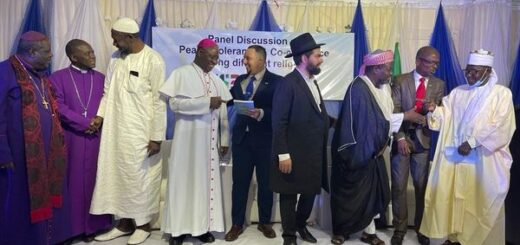The Lord has shown his salvation to the nations
by ARCH BISHOP · May 9, 2021
Sixth Sunday of Easter, Year B, Homily by Archbishop Ignatius A. Kaigama at St. Kevin’s Church Jikwoyi, Abuja, May 9, 2021.
Readings: Acts 10:25-26, 34-35, 44-48; Ps. 97 (98): 1-4; 1 Jn. 4:7-10; Jn. 15:9-17
The Lord has shown his salvation to the nations
Today, the sixth Sunday of Easter, the last before the Ascension of Christ into heaven, and two Sundays away from Pentecost, we are introduced to the issue among the early believers about whether God’s calling was exclusively for the Jews and if Christianity was to be subordinated to Judaism, or open to anyone who believed in Jesus. The first reading records a significant understanding in this regard as Peter proclaims the Good News within the household of a Gentile army officer, Cornelius.
The descent of the Holy Spirit upon the pagan listeners of Peter in Cornelius’ house showed the universality of God’s salvation. It showed that we are all created in the image and likeness of God; no life is more precious than the other; our accidental differences in race, age, gender, nationality etc do not place one individual over another. Peter asserted in Acts 10:35 that God has no favourites and anyone “who fears God and does what is right is acceptable to Him”.
By religious regulations, cultural prohibitions and social restrictions, Peter, a Jew ought to have had nothing in common with Cornelius, a pagan. But having been directed in a vision, Peter became an inclusive person, unlike before when he was exclusive and believed that salvation should not go beyond the frontiers of the Jewish nation. Peter’s vision enlightened him to stop calling what God has made clean, profane or unclean (cf. Acts 10:15, 28). God shaped his mind to see people as human beings and not through ethnic lenses.
The lesson is that God’s love is boundless. He has no favourites, and shows no partiality, but with great tenderness, love and patience, He draws all to Himself despite social, economic or cultural backgrounds.
When we meet as Christians cleansed and united by the waters of baptism, all differences and prejudices must melt away, “For all of you who were baptized into Christ have clothed yourselves with Christ. There is neither Jew nor Gentile, neither slave nor free, nor is there male and female, for you are all one in Christ Jesus” (Gal. 3:27-28).
In a city like Abuja and other big cities like Lagos, Kaduna, Ibadan, Onitsha, etc., the relationship of those living there could easily be merely one of cohabitants instead of being friends or brothers and sisters. It is no accident that God has placed us to live together irrespective of our historical origins and differences; we must learn to accommodate one another and live in the peace, solidarity and harmony that marked our traditional African societies. We need each other, and we must be united in a more purposeful manner.
St. John in the second reading and in the Gospel text reminds us of how much Christ loved us, up to giving His life for us. As God’s love is very generous and available to all without discrimination, such as His rain falls on all and His sun, moon and stars shine on all, we must also love without boundaries and discrimination.
We are taught today that love conquers all, and because of love, enemies are reconciled, warring tribes re-establish peaceful and harmonious relationships, families are united and happy, the poor and hungry are attended to, criminals mend their ways, resources and blessings are generously shared among people, the truth is proclaimed, justice and peace prevail, kindness and generosity rule in society and governance is characterized by honesty and genuine service for the common good.
To all the three hundred and seven candidates for confirmation today, and to all of us here, we are challenged to be like Jesus who calls us to be His friends, to keep His commandments continually and unconditionally.
The Gospel reading describes the qualities of who and what we become as Christians: we have been born again and we are God’s children; connected to Jesus like the branches to the vine; we remain in His love and not seasonal; we are to extend God’s love to others; like Jesus, we should be prepared to lay down our lives for others. Note the vocabularies of Jesus who says rooted in Him we become friends of God not servants; we are chosen and commissioned to bear fruits that will last. We are assured that we can ask the Father always and He will grant to us what we ask. Jesus expects us to have the kind of love that is not polluted by selfish ambitions or ill-will but characterized by self-sacrifice and service. We must wish one another well and work for what is best for one another.
In the eyes of God we are all equal; nobody is more equal than the other. It is a figment of our imagination to believe that some people are of lesser value, or inferior to us. The story of Peter teaches that anybody of any nationality or of any tribe who fears God and does what is right is acceptable to Him. The outpouring of the Holy Spirit on the people thought to be outside the realm of salvation produced the effects of their speaking in tongues and extolling the greatness of God, and then being baptized in the name of Jesus.
For us who have received the Holy Spirit, we have become the friends of Jesus and so our life must be lived in Jesus.
May God bless your Parish Priest, Fr. Moses Jimbili, his assistants, Fr. Hilary Chuwak, Fr. Benneth Umeh, and the entire parishioners of St. Kevin’s Parish, Jikwoyi, and may He continue to keep us in His love.



